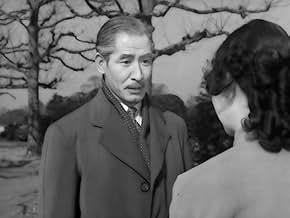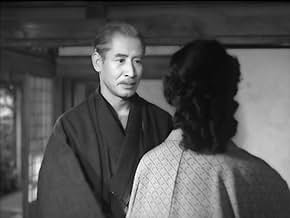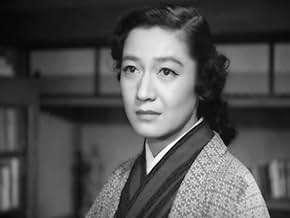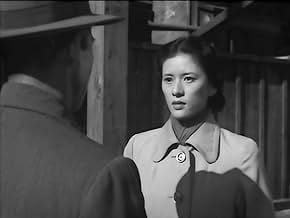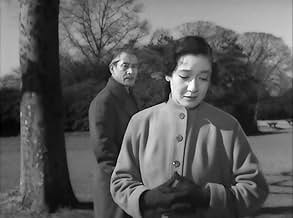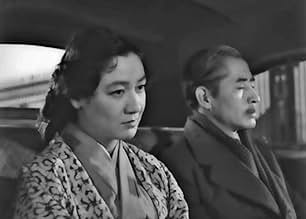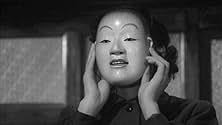CALIFICACIÓN DE IMDb
7.7/10
2.3 k
TU CALIFICACIÓN
Agrega una trama en tu idiomaAn ingratiating bride develops warm ties to her father-in-law while her cold husband blithely slights her for another woman.An ingratiating bride develops warm ties to her father-in-law while her cold husband blithely slights her for another woman.An ingratiating bride develops warm ties to her father-in-law while her cold husband blithely slights her for another woman.
- Premios
- 1 premio ganado y 1 nominación en total
- Dirección
- Guionistas
- Todo el elenco y el equipo
- Producción, taquilla y más en IMDbPro
Opiniones destacadas
There are some foreign films so steeped in their culture that as an American who knows the world only through movies, I find myself thoroughly puzzles. Sound of the Mountain is one of those movies.
The story is simple enough. A man bonds with his daughter-in-law, and is upset by the way she's treated by his odious son.
But constantly through the movie I felt like I was just missing something. Someone makes a comment and then the woman turns her head in a way to suggest something significant has happened. The man spends time talking about when someone mispronounces a word and I can't figure out why that's interesting.
I can see there is a concept of proper behavior but I can't quite find its outlines. A lot is left unsaid and I'm not sure what is meant.
I just felt kind of lost.
It's not a problem I have with all Japanese movies. I love Kurosawa, after all.
I'm not giving this a star rating because I don't feel qualified to judge this movie. It is well filmed and looks very nice, the acting is quite good, and the final scene is lovely and touching, yet I did not, for the most part, enjoy it, and if I were to give a star rating based on my subjective experience I would give it a 6 at best.
The story is simple enough. A man bonds with his daughter-in-law, and is upset by the way she's treated by his odious son.
But constantly through the movie I felt like I was just missing something. Someone makes a comment and then the woman turns her head in a way to suggest something significant has happened. The man spends time talking about when someone mispronounces a word and I can't figure out why that's interesting.
I can see there is a concept of proper behavior but I can't quite find its outlines. A lot is left unsaid and I'm not sure what is meant.
I just felt kind of lost.
It's not a problem I have with all Japanese movies. I love Kurosawa, after all.
I'm not giving this a star rating because I don't feel qualified to judge this movie. It is well filmed and looks very nice, the acting is quite good, and the final scene is lovely and touching, yet I did not, for the most part, enjoy it, and if I were to give a star rating based on my subjective experience I would give it a 6 at best.
10kerpan
"Yama no oto" is, in essence, the story of the love between a daughter-in-law (Setsuko Hara) and the father (So Yamamura) of her neglectful and selfish husband (Ken Uehara). As Yamamura becomes more and more aware of the unhappiness of Hara, he takes ever more unconventional steps to try to rescue his son's marriage (for instance, approaching his son's mistress). Though the issues of infidelity, abortion and divorce swirl through this film, the tone is remarkably low-key and unmelodramatic. The cinematography here is similar to that found in Ozu's films of this period, though not so rigorous. The performances of Hara and Yamamura are superb. A very well-done and moving film by Japan's greatest neglected master.
(1954) Sound of the Mountain/ Yama no oto
(In Japanese with English subtitles)
DRAMA
Adapted from the novel by Yasunari Kawabata, that plays like Yasujirô Ozu movie starring Setsuko Hara as an already married wife Kikuko Ogata married to a husband Shuichi Ogata (Ken Uehara) who cheats on her at the small token while living with her husbands parents. Kikuko(Haras) interventions with other characters is a backdrop to the relationship between her and her stepfather, Shingo Ogata (Sô Yamamura). AS I had pointed out, this is what Ozu does best and that he should not be the the only director to be making these drama movies when they're others. It is subtle and self-explanatory.
Adapted from the novel by Yasunari Kawabata, that plays like Yasujirô Ozu movie starring Setsuko Hara as an already married wife Kikuko Ogata married to a husband Shuichi Ogata (Ken Uehara) who cheats on her at the small token while living with her husbands parents. Kikuko(Haras) interventions with other characters is a backdrop to the relationship between her and her stepfather, Shingo Ogata (Sô Yamamura). AS I had pointed out, this is what Ozu does best and that he should not be the the only director to be making these drama movies when they're others. It is subtle and self-explanatory.
I'm well aware that Mikio Naruse is one of those holy cows of film history. Criticising him is some kind of blasphemy.
And yet I'll gladly die painfully on this hill: Every single one of his movies is terrible out of principle.
I've you've seen one Naruse, you've seen them all because there is literally nothing to it. Every single story - this one included - is basically about a ridiculously noble, self-pitying, suffering woman in a world where virtually every man is a smug, condescending parody of a man.
Women always have the moral highground and the whole thing is nothing but a mawkish didactic-play with the depth of a sunday morning cartoon.
It's redundand to say anything about his laughable radical feminism and I want my review to finally get through.
Again, his movies are objectively bad, people just don't (want to) see it because we live in objectively bad times.
And yet I'll gladly die painfully on this hill: Every single one of his movies is terrible out of principle.
I've you've seen one Naruse, you've seen them all because there is literally nothing to it. Every single story - this one included - is basically about a ridiculously noble, self-pitying, suffering woman in a world where virtually every man is a smug, condescending parody of a man.
Women always have the moral highground and the whole thing is nothing but a mawkish didactic-play with the depth of a sunday morning cartoon.
It's redundand to say anything about his laughable radical feminism and I want my review to finally get through.
Again, his movies are objectively bad, people just don't (want to) see it because we live in objectively bad times.
An honest look at marriage, adultery, divorce, and abortion, especially refreshing for 1954, and with the emotions between an elderly man (So Yamamura) and his daughter-in-law (Setsuko Hara) poignantly rendered. His son / her husband (Ken Uehara) is a real piece of work, brazenly carrying on with other women, staying out late, and getting physically abusive when they don't do as he wishes (referred to, not shown). Meanwhile the man's daughter is also in a broken marriage, returning home with her two children because her husband's cheating on her. The film calls out bad male behavior by showing its impact, and the conversations between characters feels fairly modern.
One of the things altered relative to Yasunari Kawabata's novel is the elderly man's mental state, which in this adaptation isn't declining with age, with accompanying melancholy. Another is his relationship with his daughter-in-law; clearly they have a connection in the film, but it's based on simple kindness and admiration, and erotic feelings on his part aren't involved. The result is a character who is on the surface a decent old man, still married to his own wife despite his own indiscretions and having been more attracted to her older sister long ago. He's not particularly effective in reining in his son, however, and he doesn't give his own daughter enough affection or attention, reserving those things for his daughter-in-law. In that sense he's failed in life.
As in many of her films, Setsuko Hara is the brightest light in the cast. Her character is simple, kind, and filial (derisively referred to as "childlike" by her husband), but shows a toughness in the actions she takes. Hara brings out the emotions very well, and while the ending gets a little melodramatic, it has power. Overall, just a very well done, well-paced film from Mikio Naruse.
One of the things altered relative to Yasunari Kawabata's novel is the elderly man's mental state, which in this adaptation isn't declining with age, with accompanying melancholy. Another is his relationship with his daughter-in-law; clearly they have a connection in the film, but it's based on simple kindness and admiration, and erotic feelings on his part aren't involved. The result is a character who is on the surface a decent old man, still married to his own wife despite his own indiscretions and having been more attracted to her older sister long ago. He's not particularly effective in reining in his son, however, and he doesn't give his own daughter enough affection or attention, reserving those things for his daughter-in-law. In that sense he's failed in life.
As in many of her films, Setsuko Hara is the brightest light in the cast. Her character is simple, kind, and filial (derisively referred to as "childlike" by her husband), but shows a toughness in the actions she takes. Hara brings out the emotions very well, and while the ending gets a little melodramatic, it has power. Overall, just a very well done, well-paced film from Mikio Naruse.
¿Sabías que…?
- TriviaSô Yamamura, who portrays Shingo the father, was actually one year younger than Ken Uehara, who portrayed his son Shuichi.
- Citas
Fusako Aihara: What do you think, Father? You're busy reading the newspaper. Nobody really cares about my troubles.
Shingo Ogata: I don't know what to say. From the outside, you can never tell what's really going on in a marriage.
Selecciones populares
Inicia sesión para calificar y agrega a la lista de videos para obtener recomendaciones personalizadas
Detalles
- Fecha de lanzamiento
- País de origen
- Idioma
- También se conoce como
- Sound of the Mountain
- Productora
- Ver más créditos de la compañía en IMDbPro
- Tiempo de ejecución1 hora 35 minutos
- Color
- Mezcla de sonido
- Relación de aspecto
- 1.37 : 1
Contribuir a esta página
Sugiere una edición o agrega el contenido que falta

Principales brechas de datos
By what name was Yama no oto (1954) officially released in India in English?
Responda
